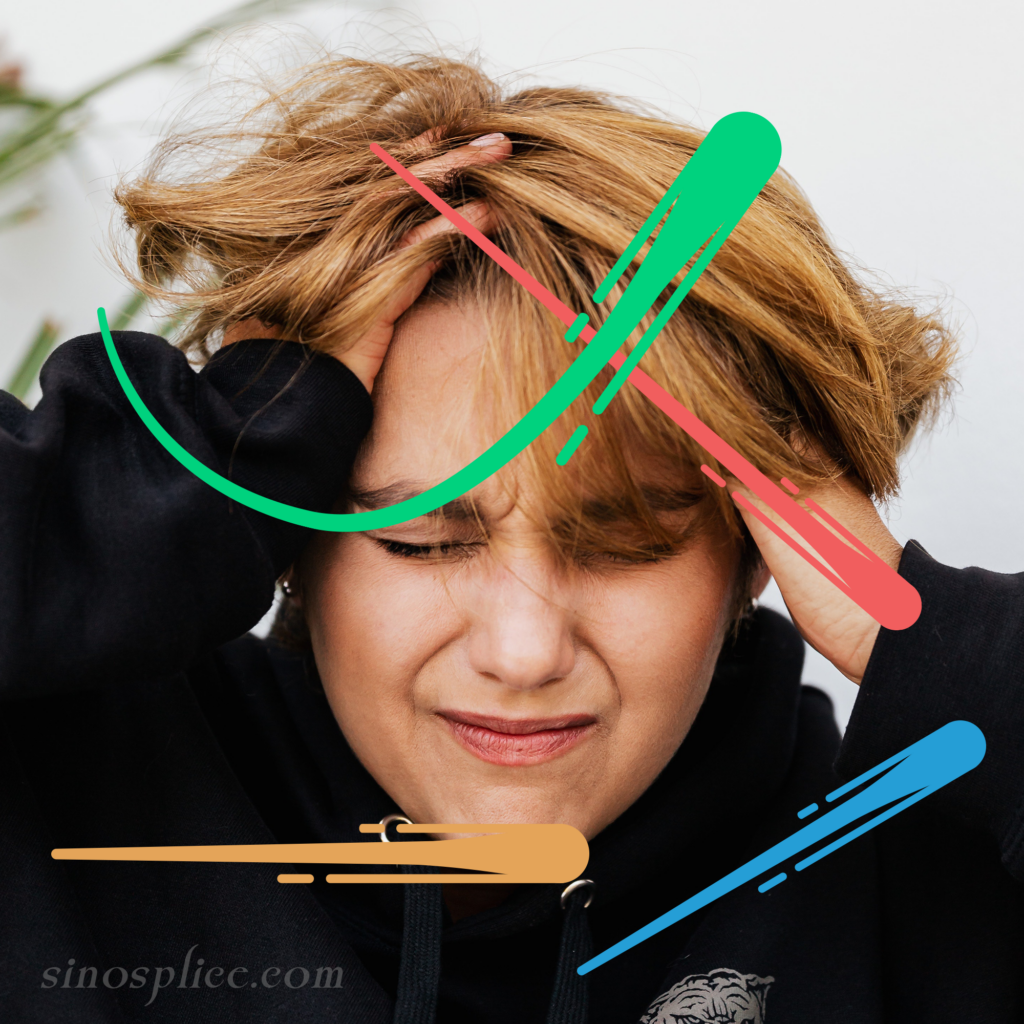Types of Tone Mistakes
As a learner of Chinese, you’re going to make mistakes with your tones. A lot of them. It’s unavoidable. It can be helpful to reflect on the kinds of mistakes you’re making, though, because it can help you realize that despite all the mangled tones, you’re actually making progress.

No, I’m not just talking about the stages of learning tones which I’ve written about before, I’m talking about mistakes which are fundamentally different in nature. As your Chinese gets better and better, you’ll keep making some mistakes, but the types of mistakes you make will change.
So without further ado, here are the 4 main types of tone mistakes:
Mistakes of Control
When you first start studying Chinese, you have no idea at all how to properly make the tones. Even if you can hear a difference, you can’t do it yourself. Or maybe you can hear and repeat it immediately after, but then quickly forget how to do it. This is all part of the process of learning tones.
Don’t think this type of mistake is only for beginners, though. Even after you can accurately produce individual tones in isolation, you’re going to have problems with tone pairs and tones across whole sentences for a while. (For me, the most insidious of these was the 3-2 tone swap error.)
Relax! Persistent effort will totally pay off. No one masters tones in 2 weeks. It takes time.

Mistakes of Ignorance
Sometimes you don’t know the tones of the words you want to use. Don’t worry; it happens to all of us. If you only use words for which you’re 100% sure of the tones, then you’re doing it wrong. Not knowing the correct tones but blundering on through anyway is just part of the learning experience.
The key here is that you eventually make the effort to learn the proper tones for the words you’re unsure of. This takes time, patience, and lots of dictionary lookups. Eventually your accumulated tonal knowledge (and proper execution) make you start sounding less like a “stereotypical foreigner” when you speak Chinese.
Mistakes of Memory
For me, this is always the most frustrating tonal mistake of all. Have you ever been sure that you know the right tones for a word, and always took care to properly pronounce that word, but then found out much later that the tones you thought you had down cold were actually wrong?
I remember when I first came to China I was sure that the word for “north,” 北, was pronounced “*bēi” (first tone rather than third). I was horrified to finally learn the truth. I’d been confidently saying it incorrectly for half a year. Nothing to do but make the mental correction and move on. Memory is never perfect, and you can’t really avoid these mistakes.

Mistakes of Influence
This one can also be frustrating, but I’d say it’s more confusing than anything. So what happens when the dictionary says a word is pronounced one way, and your friend tells you it’s pronounced a different way? Or two friends give you contradictory information, but it’s all different from what the dictionary says? Sadly, these issues invariably plague the intermediate learner of Chinese.
There are several reasons that these discrepancies arise. First is regional variation. Different parts of China pronounce some words in different ways, and although at times you’ll hear unquestionably “non-standard Mandarin,” at other times it’s unfair to call a certain regional variation “wrong” or “right” (although some Beijing have no problems at all doing this).
Second is the widespread use of dated reference materials. Printed dictionaries simply aren’t keeping pace with the rapidly evolving language of the Chinese people. New words are created, and pronunciations change (sometimes just the tones) relatively quickly.
Third is a cultural tendency to submit to the recognized authority (i.e. the outdated reference materials). So you often get exchanges like this:
A: How do you pronounce the character 血?
B: “Xuě.”
A: But the dictionary says it’s either “xuè” or “xiě.”
B: Oh yes, that’s right.
A: But you just said…

You get the idea. But what can you do? Know that dictionaries are not perfect, and no single person can be an authority on a whole language. You’re going to have to assemble your mental map of the words of the language over time, from the mouths of many speakers, not one “omniscient” teacher.
Don’t be afraid of making mistakes. They’re inevitable, and they help you learn. But as long as you’re going to be making these mistakes, you might as well look a little closer and gauge how your language ability is growing and your unruly tones are slowly but surely being tamed.

Someone thinks this story is fantastic…
This story was submitted to Hao Hao Report – a collection of China’s best stories and blog posts. If you like this story, be sure to go vote for it….
Tones are one of the main issues, as you say John.
Even Chinese give contradictory information on the correct tone, they only change their mind where there is a group consensus. So if they can be wrong, it’s understandable for a non-Chinese to wrong ‘a lot’ of the time.
Like you mention, you’ve just got to keep doing it. Personally I gave up bothering to learn the tones from any books. When I come across a new word or phrase, I just mimic their sound, sometimes I’m right, sometimes wrong (because sometimes they are too), but what can you do?
The joys of learning Chinese are never ending (a say that a bit tongue in cheek).
Perfect choice of picture by the way! I love that guy.
Had the same with “喂” : in every dictionary I have, it’s pronounced “wei4 – wèi”, but when you’re just walking in the streets in China, all you hear is “wei2 – wéi” right ?
Great post! What I say might slightly overlap your categories, but a “Mistakes of Habit” might be added. I sometimes make mistakes today that used to belong to one of your categories (ignorance, for instance), but which can’t be placed in any of your categories today. I know everything about the pronunciation and usually get it right, but because of old, bad habits I sometimes make the mistake anyway. Fortunately, I hear it myself most of the time. 🙂
Despite having studied Mandarin for over two years, I only just recently feel like I’ve nailed the 3-2 tone combo. Despite trying very hard to pronounce both tones distinctly, I was repeatedly told that my 2nd tone wasn’t “rise-y” enough.
Eventually a teacher told me that I should pretend that the 3 in a 3-2 combo is really a 4. That of course isn’t accurate, but it was a nice expedient that led me to discover the “low, short” 3rd tone that leads naturally into a full 2nd tone.
Well, the issue with “喂” is really one of context. When used to mean “to feed” (which is frankly something you don’t run into every day), it’s pronounced with 4th tone. When people started saying “wei2 – wéi” as a canned phone-answering ritual, for some reason, they used the same character to represent it, despite the different tone. Even some dictionaries have picked up on this:
http://www.nciku.com/search/zh/detail/%E5%96%82/1315945
http://www.nciku.com/search/zh/detail/%E5%96%82/1887716
There are a couple words I’m not so sure about though. “拜” is most definitely 4th tone in “拜托”, but in “拜拜” I’m not particularly sure. A very interesting example is the (southern?) pronunciation of the 2nd character in “明白”. Someone asked my teacher if it’s 4th tone (It does sound like 4th tone in most people’s speech.), but my teacher was adamant that it’s actually light tone.
A neutral tone following a second tone sounds a bit like a weak forth tone – thus your impression of most people’s speech is completely in line with the teacher’s comment. Neutral tone is different depending on what tone it follows (and also from word to depending on how much it is actually neutralized…), for example a neutral tone following a 3rd tone sounds a bit like a weak 1st tone.
Since 拜拜 is a writing of the english bye bye, I think there’s alot of latitude in its tone, and it does seem most people pronounce it somewhat like a 2nd tone, probably reflecting its origins…
A curse be upon 血 and all its pronunciations.
Just been listening to a Chinesepod lesson. What category is this tone mistake? 🙂
Intermediate – License Plate Numbers (#1619)
…
John: Alright, got it. So then she explains about the abbreviation, right? What is that word?
Dilu: 简称。简称。[pronounced 3rd tone, 1st tone]
John: Ok, 3rd tone, 4th tone.
Dilu: 没错。
John: 简称。[pronounced 3rd tone, 1st tone]
…
http://chinesepod.com/community/conversations/post/11416
Argh! I’d call that one “sloppiness.” We actually make this mistake all the time while recording, but usually we catch each other and fix it on the spot. Occasionally it slips through…
Yeah, I’ve listened to lots of Chinesepod lessons, and I’d have to say that mistakes like this are rare. So much so that I doubted my ears this time 😉
其实不只是我们外国人要忍受这种痛苦。;)
以前无意中碰到这个帖子- http://bbs.txtbbs.com/thread-607871-1-1.html -就是关于“一丘之貉”的读音。词典说“貉”是二声,日常生活中在这个成语里更多听到的是四声。
楼主说“。。。我居然念错了这么多年~~ 问了爸妈,他们也说是念第四声,可是字典摆在眼前啊”然后有一百多人来发表自己的感受,例如“啊?!!!我果真是文盲么?!!”“ 囧 原来是二声么。。。”“ 一不小心就文盲了….溜走”“ 楼主你不说我一直不知道。做了这么多年的文盲啊”
也有一些知道标准发音的人开始感激高中的教育和高考的准备,说“看来高考还是有必要滴,要不是高考复习,我还真不知道”,“哦…… 高中读久了…… 果然还是有好处的……”还有一些人得意的说 “我一直念二声的,曾经对这字认真查过字典..所以说教育要从娃娃抓起,呵呵”,“ 晕倒,竟然有这么多的人不知道念什么 太窘了”之类的话。
所以说,中文这个语言是很公平的,外国人、中国人,一样都受虐待,都要提心吊胆,因为随时可以发现自己一直以来念‘错’了。;)
说实话,我比较认同你的看法,发音正确与错误的定义似乎没有必要交给词典来判断,语言本来应该是随着大众的普遍习惯,我的英文跟词典上注释的发音有很多不同之处,从来不认为自己是错的。
但正像你指出的,中国人好像不怎么认同这种看法,在很多人的心目中词典具有一种强大的威信。语言应该随着大众的说法是有道理的,但每个社会有权利自己决定用什么方式来判断‘正确’的发音,这也是有道理的,而从高考的读音选择题,到对新闻播音员的要求,再到人们对‘不标准’的普通话的歧视,可以很明确地看到,中国人并不认为他们自己的习惯应该是语言的正确标准。。。所以到底是‘词典跟不上时代的变化’还是‘应该进一步提倡标准普通话的教育’也不是很容易定论。同样的道理,学中文的外国人应该更偏向模仿普遍听到得发音还是更多采用词典的标准,也要看个人的具体目标和主观喜好。。。
A very good post, John — I’ve been learning Chinese for nearly a decade and continue to make all four different kinds of mistake. Pronunciation is hard. But very rewarding when you improve!
What I did not do early enough was to accept that I needed focused work on my pronunciation for years if I was going to be able to speak clearly. Since I started shadow reading, recording myself, reading aloud to native speakers, and refocusing on tone memorisation, however, I’ve seen a big improvement. General conversation and classes never provided enough correction for my stubborn, tonally-challenged brain!
Chinese music sometimes makes me forget the tones of Chinese characters, because of the fact that the tones are replaced with the melody of the song. But, overall, I still do think that music can help my Chinese abilities.
1) Speaking of “mistakes of memory” makes it sound like one consciously recalls the sound of words (including tones) as one speaks, whereas in fact, I think one can say that one mostly doesn’t have time to use one’s conscious memory while speaking. In this sense, some “mistakes of memory” could perhaps be called “mistakes due to insufficient assimilation”, and are hence akin to “mistakes of ignorance”. One may be able to recall the correct tones with a few seconds to think about it, but you don’t have that luxury while speaking. Of course, the 北 example is an insidious case where the assimilation was thorough, but faulty.
2) I can’t help wondering whether “mistakes of control” are partly due to the limited range of tone combinations in English. For example, is it possible that the 3-2 tone swap error occurs because partly because in English we often use an intonation similar to 2-3 (for example, the 2-3 combination used in saying a person’s two-syllable name can convey disapproval — “Susan! What did I tell you before?”), and that 3-2 is a rather unnatural combination in English? I feel intuitively that that’s the case, anyway. Have there been any studies into the range of intonations used by native English speakers — which ones are used often, and which ones rarely?
杯京欢迎你!I said lángfèi for 浪费 for about a year or more. I guess the 北 thing is because first tone is the easiest to imitate. And the lángfèi is because second tone and fourth tone are easy to get mixed up. But I think after you make the mental correction, you won’t say it wrong ever again.
When I was directing a language program in Changchun in the 1990’s, I used to tell the students that there were 3 steps to mastering tones: 1) being able to HEAR them; 2) being able to produce them; and 3)REMEMBERING to produce them when speaking. Some students really struggled with #1. Most struggled with #2. We all tripped when we got to the 3rd step.
When I was a Russian linguist in the Air Force back in the early ’50s in Japan, a couple of my acquaintances were twin Beijing-born American-parentage Chinese linguists whose father was a professor of Chinese at Yale University (a name you would probably recognize). One day I heard them speaking to each other in Chinese, but “toneless-ly.” I asked how come they weren’t using tones. Their response was they could understand each other without them. Probably a twin thing! I didn’t speak Chinese so I couldn’t understand them, tones or no tones.
I have heard that people from Shanghai also don’t use tones when speaking Mandarin, or rather don’t use tones the same way. Not sure if this is correct. Someone living in SH can perhaps verify.
I just looked 血 up and got:
“also pron. [xue3]”
There’s still hope for us after all….